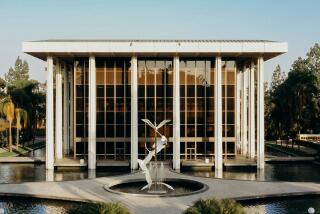MUSIC REVIEW : Slobodyanik the Son at Ambassador
- Share via
In 1968, six years before Alex Slobodyanik was born, his father, Alexander Slobodyanik, made his first Los Angeles-area appearance.
Under the auspices of S. Hurok, the 24-year-old pianist from Kiev played a recital at El Camino College. A small audience recognized the incipient virtuosity and musical individuality of Slobodyanik, father-to-be, who returned the following year to make a major debut and, as they used to say, a sensation, with the Los Angeles Philharmonic.
In 1994, history is repeating itself. Nineteen-year-old Alex, the son, made his debut at Ambassador Auditorium Monday night, producing an enthusiasm that by all rights ought to have been more vociferous.
The younger pianist Slobodyanik has earned all the medals, honors and grants with which he is credited (at this time, he is a student of Sergei Babayan at the Cleveland Institute).
He is an uncommonly polished keyboard virtuoso, flashy in technique but not in manner, poetic to a fault, musical beyond his years. His Chopin/Haydn/Rachmaninoff/Prokofiev program displayed all the ingredients for a long and successful career to come: musical depth, comprehensive technical resources, a probing mind and a clear sense of communication. Beginning with Chopin, Slobodyanik exhibited an authoritative style, mechanical ease and gifts for musical rhetoric rare in pianists of any age.
His playing of the B-flat-minor Scherzo reinstated the passions in that over-familiar showpiece; his caressing of the D-flat Nocturne, Opus 27, rivaled the loving and practiced ministrations of colleagues three times his age. His way with the B-minor Sonata had spontaneity and affection and, most of all, speed--but quickness with sense; at any tempo, his pianistic speech keeps its dignity and logic.
Saving Haydn’s C-major Sonata, Hob. XVI:48, for the second half gave it pride of place; its many beauties were not wasted on a warm-up spot. Prokofiev’s ubiquitous Seventh Sonata had freshness, kaleidoscopic emotions and, in the finale, breathtaking speed.
At the end, encores were forthcoming: a touching revival of “October” from Tchaikovsky’s “The Seasons,” and one of the “Visions Fugitives” by Prokofiev.
More to Read
The biggest entertainment stories
Get our big stories about Hollywood, film, television, music, arts, culture and more right in your inbox as soon as they publish.
You may occasionally receive promotional content from the Los Angeles Times.










